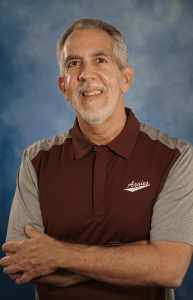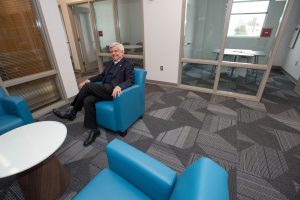By Vladimir Avina, 575-646-7234, vlad23@nmsu.edu
Contact Antonio Garcia, 575-646-2912, garcia81@nmsu.edu
Date 08/03/2020
As a land-grant institution, as well as a HSI's, New Mexico State University’s principal goals are to enhance student success and social mobility. A recently awarded $2.1 million National Science Foundation grant to the College of Engineering is directly aimed at achieving that, helping first-generation, low-income students succeed in engineering.
| |
|
 |
|
|
|
Antonio “Tony” Garcia, associate dean of academics for New Mexico State University’s College of Engineering, is principal investigator for a $2.1 million National Science Foundation grant to help first-generation, low-income students succeed in engineering. (NMSU photo by Vladimir Avina)
|
“While the student-centric culture in the College of Engineering is as old as the college itself, thanks to some legendary leaders in our past, we continue to focus our efforts to better serve students today and help them succeed not only as students but as professionals and leaders in engineering,” said College of Engineering Dean Lakshmi N. Reddi.
Led by Antonio “Tony” Garcia, associate dean of academics for the College of Engineering, the five-year program will involve an innovative cross-sector collaboration among NMSU faculty members, representatives from national laboratories and local industry. The framework will involve the addition of teaching techniques geared specifically toward adult learning to traditional college teaching methods.
A letter from NMSU President John Floros written in June 2019, stated that first-generation college students (those whose parents have not graduated from college) comprise nearly 50 percent of NMSU’s student body.
“Some of these students face a few challenges, but they can bring to the table quite a few contributions and that’s the exciting part about this,” Garcia said. “When you come from a background that’s different, there’s also an opportunity that you can see things and you can start to do things that contribute in ways that we couldn’t predict.
“This idea of adult learning is so students start realizing that there are huge numbers of resources that they can access,” Garcia said. “The College of Engineering already has several well-established programs that will serve as the foundation of this study. Giving students tools so that when the day comes where they can’t find a peer to help with an engineering class, they have the knowledge of where to find the answer or what other resources are available to them.”
A primary resource is the Eloy Torrez Family Engineering Learning Communities. The nearly 8,000 square-foot suite has study rooms, computer stations, a conference room and lounge-style areas for students. A cadre of peer learning facilitators tutor their fellow students in this facility. The facility recently added a computer lab, created more flexible hours and now has online tutoring.
“We want it to be a whole learning. We want students, faculty and industry to really come together and that’s why the Eloy Torrez Family Learning Communities plays a central role in this grant,” Garcia said.
“We’ll have more success if we teach the students how to fish. If we teach them how they can form groups and about all the online resources they can use, they’ll be able to create their own groups to learn from each other,” Garcia said. “I think that’s the goal in the learning communities. Many, many studies have shown that to be the main thing that will keep engineering students moving forward in their careers.”
| |
|
 |
|
|
New Mexico State University Chancellor Dan Arvizu visited the Eloy Torrez Family Engineering Learning Communities, which plays a central role in the National Science Foundation grant. The facility’s resources include study rooms, computer stations, a conference room, lounge-style areas and peer learning tutors. (NMSU photo by Josh Bachman) |
Engineering employers participate in various activities with the learning communities. Through this partnership with industry, certifications will be developed that will foster a perspective that students are achieving important milestones each year of their higher education. It is hoped that this will give them a sense of confidence and enhance their identity as engineers.
The college has a long-standing partnership with NMSU’s Arrowhead Center that fosters entrepreneurial efforts of students and faculty. Industrial engineering Professor Edward Pines serves as a liaison to Arrowhead through which several engineering students have achieved success through startup businesses.
“NMSU engineering also has a distinction of being well-known for projects that are about students learning,” Garcia said. “Our faculty are extremely active in one-on-one mentoring with students as well as mentoring them in their engineering clubs, so that is a really important building block to this.”
A team of faculty and staff members comprises executive, research and student success teams as well as a steering committee for the execution of this study.
The executive team is responsible for project launch, coordination, evaluation and institutionalization. The team includes Patricia Sullivan, associate dean of outreach and recruitment; Steve Stochaj, interim department head of electrical and computer engineering; and Wendy Chi, external evaluator for the project from the University of Colorado at Boulder.
The research team will conduct and analyze the research results. Chaired by Sandra Way, associate professor of sociology, the team includes Catherine Brewer, associate professor of chemical engineering; a graduate research assistant; a post-doctoral student during years two and three; and Tony McClary, program manager of the Eloy Torrez Family Engineering Learning Communities.
“I think the end goal is that employers will recognize that our students now have more professional skills as the result of little by little over four years being given an opportunity to grow and understand what engineering is about,” Garcia said.


